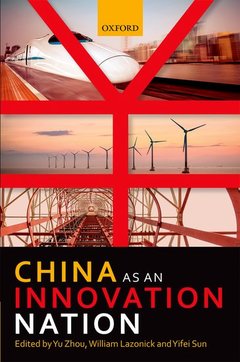Description
China as an Innovation Nation
Coordinators: Zhou Yu, Lazonick William, Sun Yifei
Language: English
Subjects for China as an Innovation Nation:
Publication date: 02-2016
368 p. · 15.8x24.1 cm · Hardback
368 p. · 15.8x24.1 cm · Hardback
Description
/li>Biography
/li>
This volume assesses China's transition to innovation-nation status in terms of social conditions, industry characteristics and economic impacts over the past three decades, also providing insights into future developments. Defining innovation as the process that generates a higher quality, lower cost product than was previously available, the introductory chapter conceptualizes the theory of an innovation nation and the lessons from Japan and Untied States. It outlines the key governance, employment and investment institutions that China must build for such transition to occur, and examines China's challenges and strategies to innovate in the era of global production systems. Two succeeding chapters explain the evolving roles of Chinese state in innovation, and the new landscape of venture capital finance. The remaining chapters provide studies of major industries, which contain analyses of the evolving roles of investment by government agencies and business interests in the process. Included in these studies are traditional industries such as mechanical engineering, railroads, and automobiles; rapidly evolving and internationally highly integrated industries such as information-and-communication-technology (ICT); and newly emerging sectors such as wind and solar energy. Written by leading academics in the field, studies in this volume reveal Chinese innovation as diverse across industries and enterprises and fluid over time. In each sector, we observe continued co-evolution of state policy, market demand, and technology development. The strategies and structures of individual companies and industrial ecosystems are changing rapidly. The sum total of the studies is a great step forward in our understanding of the industrial foundations of China's attempt to become an innovation nation.
Yu Zhou is a Professor of Geography at Vassar College. She received Bachelor and master degree in urban and environmental sciences at Peking University and her PhD. in Geography at University of Minnesota in 1995. Her research is on globalization and high-tech industry in China, and ethnic communities and transnational business networks in the United States. She is the author of the book The inside story of China's high-tech industry: making Silicon Valley in Beijing (2008). She has received multiple grants and awards, and was selected as one of the Public Intellectual Fellows by National Committee of United States-China Relations. William Lazonick is Professor of Economics and Director of the Center for Industrial Competitiveness at University of Massachusetts Lowell. He is Co-founder and President of The Academic-Industry Research Network. Lazonick is also a visiting Professor at the University of Ljubljana, the Telecom School of Management, Paris, and the Munk Centre of Global Affairs, University of Toronto. He holds a B.Com from the University of Toronto (1968), M.Sc. (Econ) from the London School of Economics (1969), and Ph.D. in economics from Harvard University (1975). In 1991 Uppsala University awarded him an honorary doctorate for his work on the theory and history of economic development. Yifei Sun is Professor of Economic Geography at the Department of Geography, California State University, Northridge (CSUN). Dr. Yifei Sun has worked as the principal investigator for two projects supported by the U.S. National Science Foundation. One project examined foreign R&D in China while the other analyzed the technological innovation in China's information communication technology industries. He has published more than thirty articles in leading international journals such as Journal of Economic Geography, Technovation, Regional Studies, Environment and Planning A, and International Journal of Technology Management. Dr. Yifei Sun has co-edited five special issues
© 2024 LAVOISIER S.A.S.




